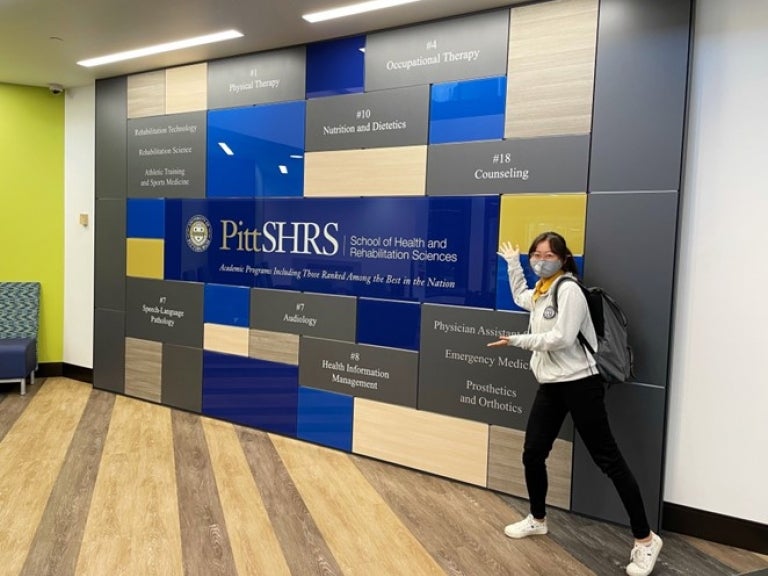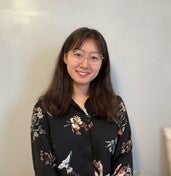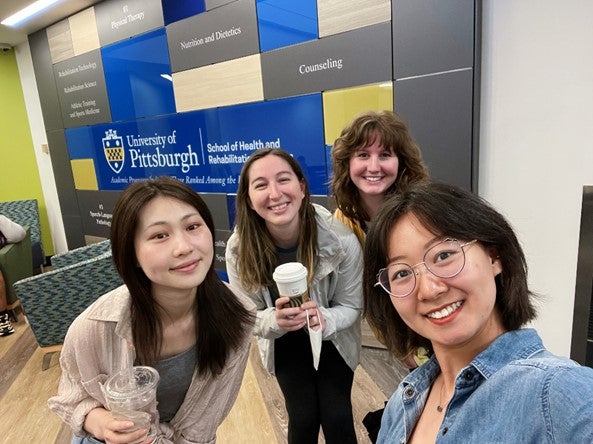
Hermione (Huazheng) Huo’s first day at SHRS
From the beginning
It all starts as a good old cheesy story: growing up, I always found it interesting to hear people’s stories, comfort my peers and help sort things out.
When it was time to go to college, my family and I decided that I would study abroad here in the United States. I am originally from mainland China, more specifically from the province Nei Mongol. When I got to the United States, I studied at Carroll University in Wisconsin and received my undergraduate degree in psychology and later added a second major in graphic design to further explore my other interests.
During my undergraduate career, I was highly involved in campus groups and activities to push myself out of my comfort zone. Doing so allowed me to practice my English and work with people from various cultures. I was also an orientation mentor for three years, a position that gave me the opportunity to facilitate events for international students navigating through their first few weeks on campus. It made me more interested in working with people from different cultural backgrounds and assisting them through times of transition. I have also always been intrigued by talking to people to help them process challenges and assist them to improve their mental health. Studying mental health counseling seemed like a great fit.
Looking for my program
When I started applying to graduate schools, I looked for programs in counseling. I wanted to go to a bigger and more diverse city and the University of Pittsburgh was a great match for me. It would provide me with the kind of experiences and environment I wanted without putting myself in an overwhelmingly big city. Upon arrival, every faculty and staff member I interacted with was very friendly and I was provided with a lot of helpful resources to explore campus and the city.
I did consider applying for my PhD in psychology. However, as I’m learning more in the Counseling program, I am glad that I am here at the School of Health and Rehabilitation Sciences (SHRS). This program provides both theory learning and hands-on skill practices. This will build a solid foundation for me to move forward to either work with clients or pursue a doctoral degree.
Huo (front right) and classmates
Hands-on Experience
This program has given me the opportunity to work in a variety of places. I did my practicum at Connection: Counseling & Consultation. At this practice, I participated in supporting kids, especially neurodivergent children, in group settings at the Jewish Community Center (JCC) camp.
Moving into my second year in the program, I started my internship at Pittsburgh Mercy’s Child and Adolescent Partial Hospitalization Program (PHP). As a graduate intern there, I have been giving a lot of guidance and opportunities to work as part of the interdisciplinary team, providing sessions, developing treatment plans, and doing case management and care coordination. I work three days a week with kids under the age of 12, providing individual and family sessions. I get chances to shadow and facilitate group and intake sessions at my internship as well.
I have been learning a lot at PHP about how to get client/families engaged, arrange services for clients’ discharge plans and advocate for my clients in the interdisciplinary team (consisting of a psychiatrist, psychiatric nurse, team lead, program supervisor, etc.) This internship helps me have a better understanding of resource disparities and the importance of client advocacy and interdisciplinary work, even with a client’s other mental health providers, school and other family members. I've also gained a better understanding of how difficult it can be for children with mental health struggles to navigate through schoolwork and the school system, especially when they also have complicated family dynamics.
Participating in Research
I am honored to work with Program Director and Professor Eric Meyer as a part of his research project Pitt Center for Emergency Responder Wellness to provide counseling services to promote wellness for first responders. Through this opportunity, I get to learn about the first responder culture and the Unified Protocols for Transdiagnostic Treatment of Emotional Disorders. This opportunity also allows me to work with adults for the first time and broaden my experience.
It’s impressive to see how much first responders’ taxing work nature affects or adds to their mental health concerns. This experience has also widened my practice skills in providing culturally sensitive counseling.
As an international student and someone who values multicultural experiences, I have also been a part of the Counseling Student Association at the University of Pittsburgh (CSAP). By taking a leadership role in the organization, my peers and I are hoping to present and connect counseling students with more professional opportunities.
Plans for the Future
After graduation, I would like to continue working with children, especially those with developmental disorders/struggles in a higher level of care (higher level refers to the intensity of care, like partial hospitalization program, where I’m doing my internship) and provide holistic approach with multidisciplinary collaboration. I would also like to further develop my knowledge in how to conduct and interpret assessments. If possible, I am interested to see adult clients, like first responders, in a small capacity to further explore my interests.
I am also motivated to do advocacy work within the Asian community to bring more awareness to mental health, especially for immigrant families. I want to use what I have learned to give back to my community by providing bilingual services. This will allow me to connect Chinese-speaking clients/families in need with counseling services or family sessions, provide psychoeducation in Chinese and post mental health related content in Chinese on social media. Professionally, I will work on becoming a clinical rehabilitation counselor (CRC) or National Certified Counselor (NCC), which Pitt’s program prepared me to do and is essential for becoming a licensed professional counselor (LPC) later down the road.
---

Written by Hermione (Huazheng) Huo
Clinical Rehabilitation and Mental Health Counseling (MS ‘23)
---
Published May 1, 2023
Updated May 11, 2023

